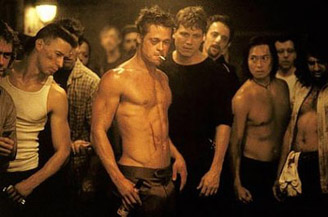Before Their Time: Fight Club
By Daniel MacDonald
April 30, 2009
So why the disconnect between unsuspecting moviegoers? The most obvious culprit, based on negative reviews and word-of-mouth, was a complete misreading of the movie's message. Accusations of 'fascism', 'misogyny', and 'glorifying violence' were liberally leveled at the picture, as if it were an endorsement of the type of behavior in which Tyler convinces the unnamed narrator to take part. But it's not. Fight Club is not a movie about superficial philosophy and the male's need for an outlet with which to place his aggression; Fight Club is a satire of all that. Fight Club is a comedy.
I admit it - on first viewing, as I sat in the theater watching Pitt and Norton beat each other silly in the darkened parking lot and ask questions like, "How much can you know about yourself if you've never been in a fight?" it occurred to me that I hadn't ever been in a fight either (for the record, I was challenged to one in high school: I showed up, he didn't). Maybe I should try it. As the film goes on, it becomes increasingly clear just how ridiculous the thesis presented is meant to be taken, leading up to the mind-blowing twist and sort of feel-good ending. None of the picture was meant to be taken seriously, and the second time around, I laughed my ass off.
Every element of Fight Club is taken to an absurd level, from Meat Loaf's huge breasts to the CGI-enhanced sex scene to Jared Leto's character existing for the express purpose of having his face smashed in. Even the cinematography is ridiculously dark, so much so as one can barely make out what's happening some of the time - as if the lighting were mocking the movie's murky tone. Ironically, if Fincher weren't such a good filmmaker, and Fight Club's dark vision not so successfully realized, more people might have been in on the joke. As it happened, however, people read Fight Club as a war cry for disaffected, financially stable young males whose fathers didn't love enough, and with this they were mighty offended.
There are still those for whom Fight Club continues to be a prime example of all that is wrong with movies today, who see only the violent, realistic portrayal of bare-knuckles fighting (as if presenting a sanitized version would be better in the long run for young, impressionable minds) and the raw masculinity, not the criticism of same woven beneath. And that's fine: the best, most lasting films are those that provoke strong reactions, both positive and negative. But for me, Fight Club will always represent the power that movies hold to affect us while they entertain, and it deserves to be counted among the great movies of the past hundred years.
Continued:
1
2
|
|
|
|




